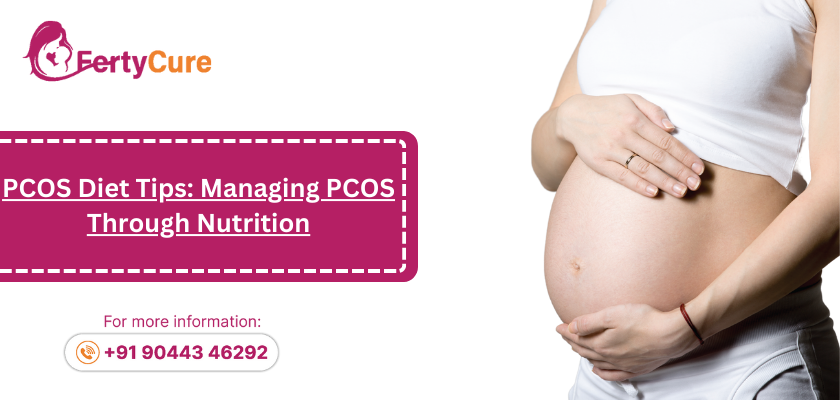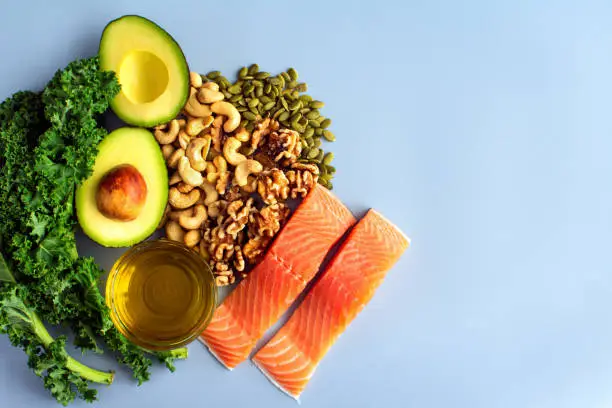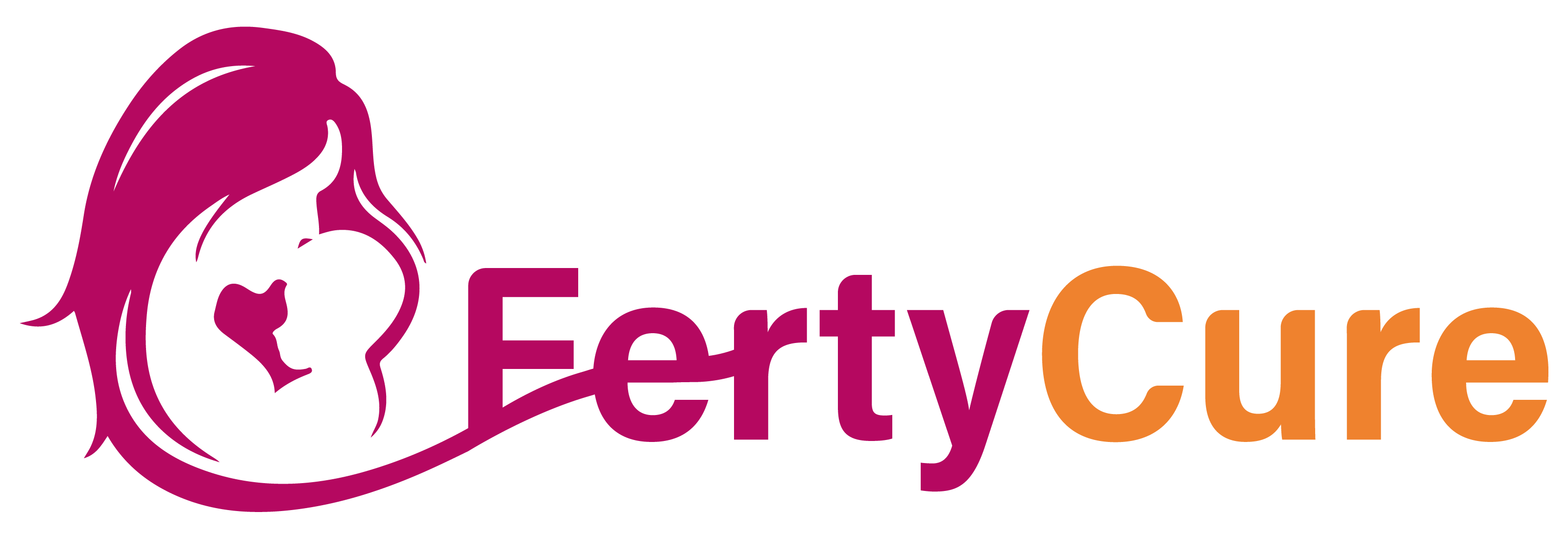Table of Contents
PCOS Diet Tips: Managing Polycystic Ovary Syndrome Through Nutrition
Polycystic Ovary Syndrome stands as a hormonal intricacy that exerts its influence upon the ovaries, leading to their enlargement and the formation of diminutive cystic structures. Characterized by various symptoms such as irregular menstrual cycles, excessive hair growth, and ovarian cysts, PCOS can also lead to weight gain and insulin resistance.
While there is no cure for PCOS, its symptoms can be managed through various approaches, including lifestyle changes. One crucial aspect of managing PCOS diet tips is adopting a proper diet that supports hormonal balance, manages insulin levels, and promotes overall well-being. In this article, we will delve into the world of PCOS diet tips and nutrition, to effectively manage this condition.

1. Understanding PCOS: A Brief Overview
Polycystic Ovary Syndrome stands as a hormonal intricacy that exerts its influence upon the ovaries, leading to their enlargement and the formation of diminutive cystic structures. These cysts are not harmful but can lead to hormone imbalances, which in turn result in various symptoms. These symptoms include irregular or absent menstrual periods, fertility challenges, excessive hair growth (hirsutism), acne, and weight gain. Additionally, PCOS can contribute to long-term health issues such as diabetes and heart disease.
Related Article: IVF Treatment for PCOS: A Comprehensive Guide in 2023
2. The Role of Nutrition in PCOS Management
Nutrition plays a pivotal role in managing PCOS because what you eat directly affects your hormonal balance and insulin sensitivity. Insulin resistance is common in women with PCOS, which can lead to weight gain and an increased risk of type 2 diabetes. By making informed dietary choices, you can help regulate insulin levels, manage weight, and alleviate PCOS symptoms.
Related Article: Pregnancy with PCOS – Comprehensive Guide & Solutions
3. Key PCOS diet tips for its management

3.1 The Importance of Balanced Carbohydrates
Choosing the right carbohydrates is crucial for managing PCOS. Opt for complex carbohydrates such as whole grains (brown rice, quinoa, whole wheat), legumes, and starchy vegetables. These carbohydrates have a slower impact on blood sugar levels, preventing insulin spikes and crashes.
3.2 Embracing Lean Protein Sources

Incorporate lean protein sources into your diet to support muscle health and keep you feeling full. Examples include lean meats, poultry, fish, tofu, tempeh, and legumes.
3.3 Incorporating Healthy Fats
In the realm of hormonal balance and holistic health, incorporating sources of healthy fats is paramount. Avocados, nuts, seeds, and olive oil stand as vital contributors to hormone production and the overarching well-being of the body. Omega-3 fatty acids, found in fatty fish like salmon, can also help reduce inflammation and regulate hormones.
3.4 Prioritizing Fiber-Rich Foods
Fiber aids in digestion, promotes satiety, and helps stabilize blood sugar levels. Choose to embrace a diet rich in fibrous nourishment, favoring the consumption of whole grains, fruits, vegetables, and legumes.
3.5 Nutrient-Dense Fruits and Vegetables
Colorful fruits and vegetables are rich in antioxidants and nutrients that support hormonal balance. The bounty of benefits lies within berries, verdant leafy greens, zesty citrus fruits, and the nourishing realm of cruciferous vegetables.
3.6 Managing Caffeine and Alcohol Intake
Excessive caffeine and alcohol consumption can disrupt hormonal balance and exacerbate PCOS symptoms. Limit your intake of both to support your overall health.
3.7 Hydration and Its Impact on Hormonal Balance
Staying hydrated is essential for hormone regulation and overall health. Sustain the orchestration of your body’s intricate functions by diligently quenching its thirst with an ample intake of water throughout the course of the day.
3.8 The Significance of Regular Meals
Skipping meals can lead to blood sugar fluctuations and overeating later on. Strive to maintain a rhythm of consistent, well-balanced meals and snacks, ensuring the stability of your energy levels throughout the day.
3.9 Mindful Eating for PCOS
Practicing mindful eating can help you listen to your body’s hunger and fullness cues, preventing overeating and supporting weight management.
3.10 The Role of Supplements
Certain supplements, such as inositol, vitamin D, and omega-3 fatty acids, may offer additional support in managing PCOS symptoms. Consult a healthcare professional before incorporating supplements into your routine.
Related Article: 5 Hidden PCOS Symptoms: Do You Have Them?
4. Creating a PCOS-Friendly Meal Plan
Designing a meal plan that aligns with PCOS management involves balance and variety. A typical day could include a breakfast of Greek yogurt with berries and nuts, a lunch of grilled chicken salad with mixed vegetables, an afternoon snack of carrot sticks and hummus, and a dinner of baked salmon with quinoa and steamed broccoli.
Related Article: Exclusive: One Simple Trick for PCOS Management!
5. Physical Activity and PCOS: A Holistic Approach
Combining a balanced diet with regular physical activity is essential for PCOS management. Exercise improves insulin sensitivity, aids weight loss, and boosts mood. Set your sights on achieving a blend of cardiovascular workouts, strength-building exercises, and activities that enhance flexibility and mobility.
Related Article: 10 Shocking PCOS Facts You Don’t Know
6. Stress Management and Sleep Quality
Stress can worsen PCOS symptoms by impacting hormone levels. Practice stress-reducing techniques such as deep breathing, meditation, yoga, and spending time in nature. Additionally, prioritize quality sleep, as sleep disturbances can further disrupt hormonal balance.
7. Seeking Professional Guidance
Individualized guidance is invaluable when managing PCOS. Consult a registered dietitian or healthcare professional who specializes in PCOS to create a tailored plan that addresses your unique needs.
Conclusion
Effectively managing Polycystic Ovary Syndrome requires a holistic approach that encompasses nutrition, exercise, stress management, and professional guidance. By making informed dietary choices and adopting a healthy lifestyle, you can alleviate PCOS symptoms, regulate hormonal imbalances, and enhance your overall well-being. Remember, consistency and patience are key as you embark on this journey toward better health.
FAQs (Frequently Asked Questions)
1. Can a specific diet cure PCOS?
While there is no cure for PCOS, a balanced and healthy diet can significantly alleviate its symptoms and improve overall quality of life.
5. Is weight gain inevitable with PCOS?
2. Are there foods I should completely avoid with PCOS? It's advisable to limit processed foods, sugary snacks, and beverages high in added sugars. Additionally, some women with PCOS may benefit from reducing dairy and gluten intake. Weight gain is a common symptom of PCOS due to insulin resistance and hormonal imbalances. However, a healthy diet and regular exercise can help manage and prevent excessive weight gain
3. How does PCOS affect fertility?
PCOS can disrupt ovulation, leading to irregular menstrual cycles and fertility challenges. However, lifestyle changes, including diet and exercise, can improve fertility outcomes.
4. Can supplements replace a PCOS-friendly diet?
Supplements should complement a PCOS-friendly diet, not replace it. A well-rounded diet provides essential nutrients that supplements alone cannot replicate.
